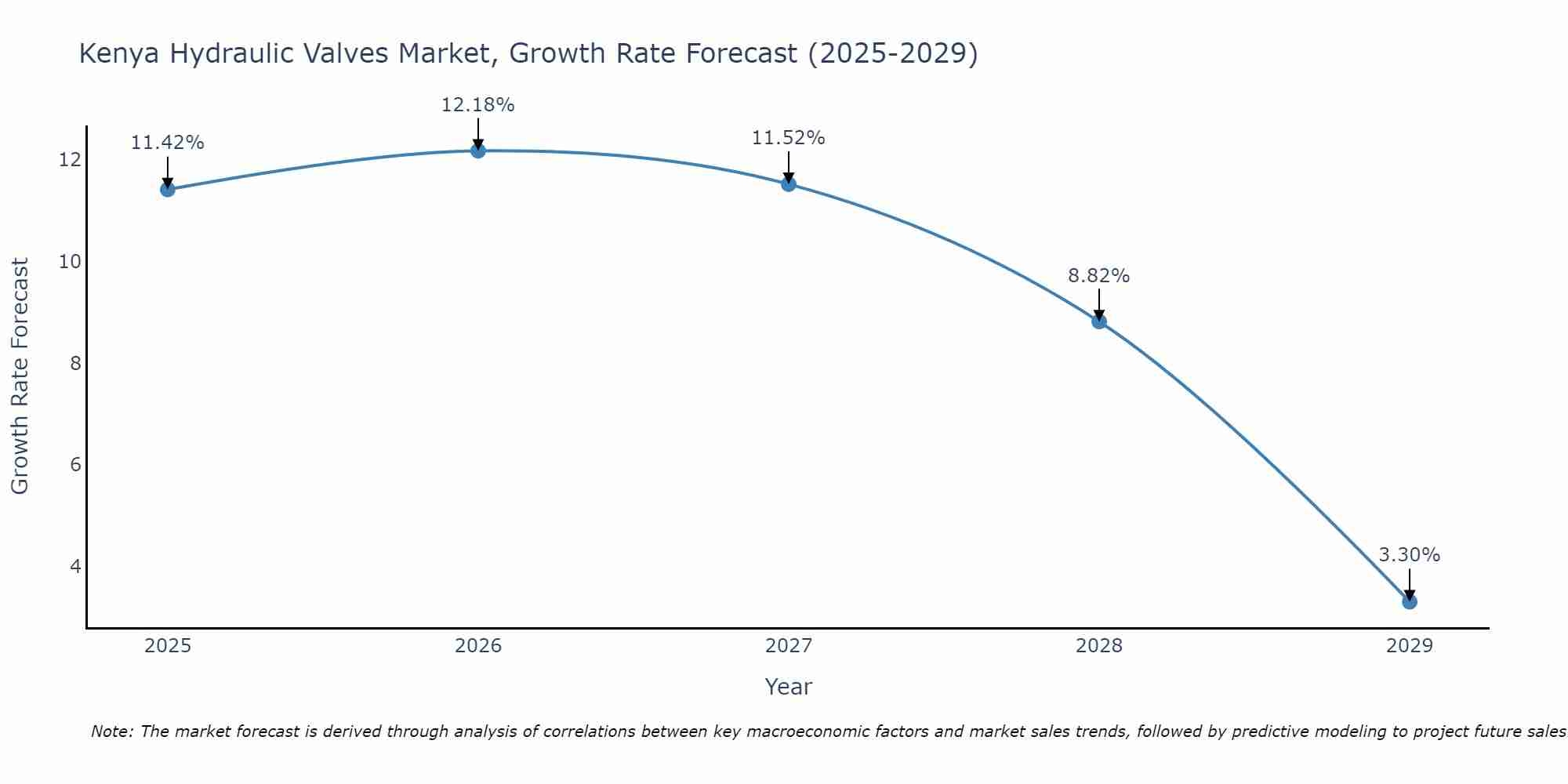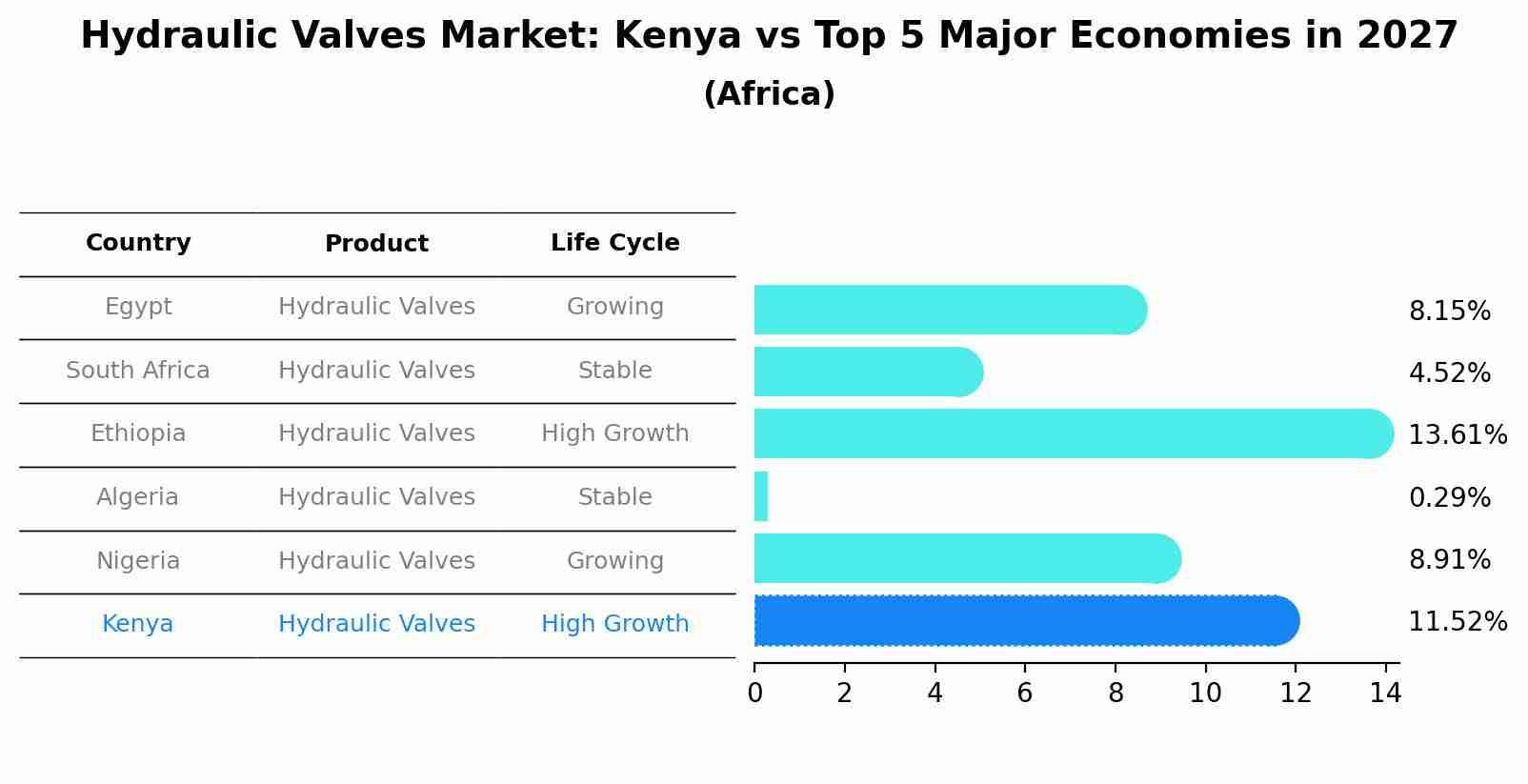Kenya Hydraulic Valves Market Outlook | Revenue, Growth, Analysis, Share, Industry, Companies, COVID-19 IMPACT, Trends, Value, Forecast & Size
| Product Code: ETC365090 | Publication Date: Aug 2022 | Updated Date: Aug 2025 | Product Type: Market Research Report | |
| Publisher: 6Wresearch | Author: Bhawna Singh | No. of Pages: 75 | No. of Figures: 35 | No. of Tables: 20 |
Kenya Hydraulic Valves Market Size Growth Rate
The Kenya Hydraulic Valves Market is projected to witness mixed growth rate patterns during 2025 to 2029. Growth accelerates to 12.18% in 2026, following an initial rate of 11.42%, before easing to 3.30% at the end of the period.

Hydraulic Valves Market: Kenya vs Top 5 Major Economies in 2027 (Africa)
The Hydraulic Valves market in Kenya is projected to grow at a high growth rate of 11.52% by 2027, highlighting the country's increasing focus on advanced technologies within the Africa region, where Egypt holds the dominant position, followed closely by South Africa, Ethiopia, Algeria and Nigeria, shaping overall regional demand.

Kenya Hydraulic Valves Market Synopsis
The Kenya Hydraulic Valves Market is experiencing steady growth driven by increasing industrialization and infrastructure development in the country. Key factors contributing to market expansion include the rising demand for construction machinery, agricultural equipment, and automotive applications that rely on hydraulic systems. The market is characterized by a growing preference for energy-efficient and environmentally friendly hydraulic valves, leading to the adoption of advanced technologies such as proportional and servo valves. Local manufacturers and international players are actively competing in the market to meet the diverse needs of industries such as manufacturing, agriculture, construction, and mining. Government initiatives to promote industrial growth and investments in key sectors are also driving market growth, with a focus on improving efficiency and productivity through the use of high-quality hydraulic valves.
Kenya Hydraulic Valves Market Trends
The Kenya Hydraulic Valves Market is experiencing a growing demand for advanced and efficient hydraulic valves, driven by the increasing industrialization in the country. Key trends include the adoption of smart hydraulic valves with integrated sensors for real-time monitoring and control, as well as the shift towards environmentally friendly and energy-efficient valves to comply with sustainability regulations. Additionally, there is a rising preference for customized hydraulic valve solutions to meet specific operational requirements across various industries such as manufacturing, construction, and agriculture. Market players are focusing on product innovation, technological advancements, and strategic partnerships to cater to the evolving needs of the market and gain a competitive edge in the Kenya Hydraulic Valves Market.
Kenya Hydraulic Valves Market Challenges
In the Kenya Hydraulic Valves Market, some of the key challenges faced include a lack of awareness and understanding of the benefits of hydraulic valves among potential end-users, as well as limited access to technical expertise for proper installation and maintenance. Additionally, the market is characterized by a high level of competition from both local and international manufacturers, leading to price wars and margin pressures. Infrastructure constraints, such as unreliable power supply and inadequate transportation networks, also pose challenges to the distribution of hydraulic valves within the country. Lastly, fluctuations in currency exchange rates and economic uncertainties can impact the cost of imported hydraulic valves, affecting the overall competitiveness of local suppliers in the market.
Kenya Hydraulic Valves Market Investment Opportunities
The Kenya Hydraulic Valves Market presents promising investment opportunities due to the country`s growing industrial sector and increasing infrastructure projects. With the rising demand for efficient hydraulic systems in various industries such as construction, agriculture, and manufacturing, there is a need for high-quality hydraulic valves. Investors can explore opportunities in supplying hydraulic valves to equipment manufacturers, offering maintenance and repair services, or even setting up manufacturing facilities in Kenya to cater to the local market and potentially export to neighboring countries. Additionally, with the government`s focus on infrastructure development and technological advancements, there is a growing need for innovative hydraulic valve solutions, making it an attractive market for investment in research and development to stay competitive.
Jordan Agar Market Government Policies
The Kenyan government has implemented various policies related to the Hydraulic Valves Market to promote local manufacturing and employment opportunities. These policies include the Buy Kenya, Build Kenya initiative, which encourages the use of locally manufactured products in government projects to boost domestic production. Additionally, the government has implemented tariff and non-tariff measures to protect local manufacturers from cheap imports and promote the growth of the domestic hydraulic valves industry. Furthermore, the government has established partnerships with industry stakeholders to promote skills development and technology transfer in the sector. Overall, these policies aim to support the growth of the hydraulic valves market in Kenya by creating a conducive environment for local manufacturers to thrive and compete both domestically and internationally.
Kenya Hydraulic Valves Market Future Outlook
The future outlook for the Kenya Hydraulic Valves Market appears promising, driven by increasing industrialization, infrastructure development, and growing investments in the construction sector. The demand for hydraulic valves is expected to rise due to the expansion of manufacturing facilities, agricultural mechanization, and the adoption of advanced technologies in various industries. Additionally, government initiatives to improve water resource management and irrigation systems are likely to boost the market further. With a focus on enhancing operational efficiency and reducing energy consumption, the trend towards automation and smart technologies is anticipated to propel the growth of the hydraulic valves market in Kenya in the coming years. However, factors such as fluctuating raw material prices and competition from alternative technologies may pose challenges to market players.
Key Highlights of the Report:
- Kenya Hydraulic Valves Market Outlook
- Market Size of Kenya Hydraulic Valves Market, 2021
- Forecast of Kenya Hydraulic Valves Market, 2031
- Historical Data and Forecast of Kenya Hydraulic Valves Revenues & Volume for the Period 2018 - 2031
- Kenya Hydraulic Valves Market Trend Evolution
- Kenya Hydraulic Valves Market Drivers and Challenges
- Kenya Hydraulic Valves Price Trends
- Kenya Hydraulic Valves Porter's Five Forces
- Kenya Hydraulic Valves Industry Life Cycle
- Historical Data and Forecast of Kenya Hydraulic Valves Market Revenues & Volume By Type for the Period 2018 - 2031
- Historical Data and Forecast of Kenya Hydraulic Valves Market Revenues & Volume By Directional Control Valves for the Period 2018 - 2031
- Historical Data and Forecast of Kenya Hydraulic Valves Market Revenues & Volume By Pressure Control Valves for the Period 2018 - 2031
- Historical Data and Forecast of Kenya Hydraulic Valves Market Revenues & Volume By Flow Control Valves for the Period 2018 - 2031
- Historical Data and Forecast of Kenya Hydraulic Valves Market Revenues & Volume By End-Use for the Period 2018 - 2031
- Historical Data and Forecast of Kenya Hydraulic Valves Market Revenues & Volume By Construction Machinery for the Period 2018 - 2031
- Historical Data and Forecast of Kenya Hydraulic Valves Market Revenues & Volume By Agriculture Machinery for the Period 2018 - 2031
- Historical Data and Forecast of Kenya Hydraulic Valves Market Revenues & Volume By Material Handling for the Period 2018 - 2031
- Historical Data and Forecast of Kenya Hydraulic Valves Market Revenues & Volume By Automotive for the Period 2018 - 2031
- Historical Data and Forecast of Kenya Hydraulic Valves Market Revenues & Volume By Oil & Gas for the Period 2018 - 2031
- Historical Data and Forecast of Kenya Hydraulic Valves Market Revenues & Volume By Power Generation for the Period 2018 - 2031
- Historical Data and Forecast of Kenya Hydraulic Valves Market Revenues & Volume By Metal & Mining for the Period 2018 - 2031
- Historical Data and Forecast of Kenya Hydraulic Valves Market Revenues & Volume By Others for the Period 2018 - 2031
- Historical Data and Forecast of Kenya Hydraulic Valves Market Revenues & Volume By Flow Rate for the Period 2018 - 2031
- Historical Data and Forecast of Kenya Hydraulic Valves Market Revenues & Volume By Below 50 L/min for the Period 2018 - 2031
- Historical Data and Forecast of Kenya Hydraulic Valves Market Revenues & Volume By 50-200 L/min for the Period 2018 - 2031
- Historical Data and Forecast of Kenya Hydraulic Valves Market Revenues & Volume By 201-500 L/min for the Period 2018 - 2031
- Historical Data and Forecast of Kenya Hydraulic Valves Market Revenues & Volume By 501-1000 L/min for the Period 2018 - 2031
- Historical Data and Forecast of Kenya Hydraulic Valves Market Revenues & Volume By Above 1000 L/min for the Period 2018 - 2031
- Historical Data and Forecast of Kenya Hydraulic Valves Market Revenues & Volume By Operation for the Period 2018 - 2031
- Historical Data and Forecast of Kenya Hydraulic Valves Market Revenues & Volume By Manual for the Period 2018 - 2031
- Historical Data and Forecast of Kenya Hydraulic Valves Market Revenues & Volume By Automated for the Period 2018 - 2031
- Kenya Hydraulic Valves Import Export Trade Statistics
- Market Opportunity Assessment By Type
- Market Opportunity Assessment By End-Use
- Market Opportunity Assessment By Flow Rate
- Market Opportunity Assessment By Operation
- Kenya Hydraulic Valves Top Companies Market Share
- Kenya Hydraulic Valves Competitive Benchmarking By Technical and Operational Parameters
- Kenya Hydraulic Valves Company Profiles
- Kenya Hydraulic Valves Key Strategic Recommendations
Frequently Asked Questions About the Market Study (FAQs):
- Single User License$ 1,995
- Department License$ 2,400
- Site License$ 3,120
- Global License$ 3,795
Search
Thought Leadership and Analyst Meet
Our Clients
Related Reports
- Afghanistan Apparel Market (2026-2032) | Growth, Outlook, Industry, Segmentation, Forecast, Size, Companies, Trends, Value, Share, Analysis & Revenue
- Canada Oil and Gas Market (2026-2032) | Share, Segmentation, Value, Industry, Trends, Forecast, Analysis, Size & Revenue, Growth, Competitive Landscape, Outlook, Companies
- Germany Breakfast Food Market (2026-2032) | Industry, Share, Growth, Size, Companies, Value, Analysis, Revenue, Trends, Forecast & Outlook
- Australia Briquette Market (2025-2031) | Growth, Size, Revenue, Forecast, Analysis, Trends, Value, Share, Industry & Companies
- Vietnam System Integrator Market (2025-2031) | Size, Companies, Analysis, Industry, Value, Forecast, Growth, Trends, Revenue & Share
- ASEAN and Thailand Brain Health Supplements Market (2025-2031) | Strategy, Consumer Insights, Analysis, Investment Trends, Opportunities, Growth, Size, Share, Industry, Revenue, Segments, Value, Segmentation, Supply, Forecast, Restraints, Outlook, Competition, Drivers, Trends, Demand, Pricing Analysis, Competitive, Strategic Insights, Companies, Challenges
- ASEAN Bearings Market (2025-2031) | Strategy, Consumer Insights, Analysis, Investment Trends, Opportunities, Growth, Size, Share, Industry, Revenue, Segments, Value, Segmentation, Supply, Forecast, Restraints, Outlook, Competition, Drivers, Trends, Demand, Pricing Analysis, Competitive, Strategic Insights, Companies, Challenges
- Europe Flooring Market (2025-2031) | Outlook, Share, Industry, Trends, Forecast, Companies, Revenue, Size, Analysis, Growth & Value
- Saudi Arabia Manlift Market (2025-2031) | Outlook, Size, Growth, Trends, Companies, Industry, Revenue, Value, Share, Forecast & Analysis
- Uganda Excavator, Crane, and Wheel Loaders Market (2025-2031) | Strategy, Consumer Insights, Analysis, Investment Trends, Opportunities, Growth, Size, Share, Industry, Revenue, Segments, Value, Segmentation, Supply, Forecast, Restraints, Outlook, Competition, Drivers, Trends, Demand, Pricing Analysis, Competitive, Strategic Insights, Companies, Challenges
Industry Events and Analyst Meet
Whitepaper
- Middle East & Africa Commercial Security Market Click here to view more.
- Middle East & Africa Fire Safety Systems & Equipment Market Click here to view more.
- GCC Drone Market Click here to view more.
- Middle East Lighting Fixture Market Click here to view more.
- GCC Physical & Perimeter Security Market Click here to view more.
6WResearch In News
- Doha a strategic location for EV manufacturing hub: IPA Qatar
- Demand for luxury TVs surging in the GCC, says Samsung
- Empowering Growth: The Thriving Journey of Bangladesh’s Cable Industry
- Demand for luxury TVs surging in the GCC, says Samsung
- Video call with a traditional healer? Once unthinkable, it’s now common in South Africa
- Intelligent Buildings To Smooth GCC’s Path To Net Zero


















